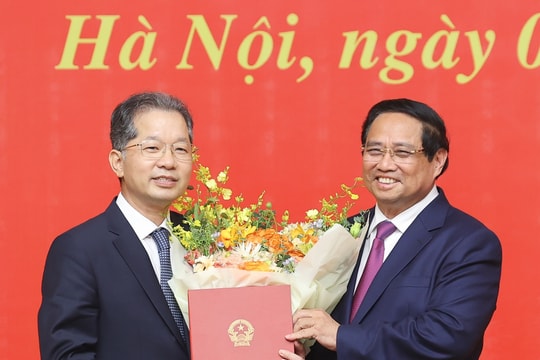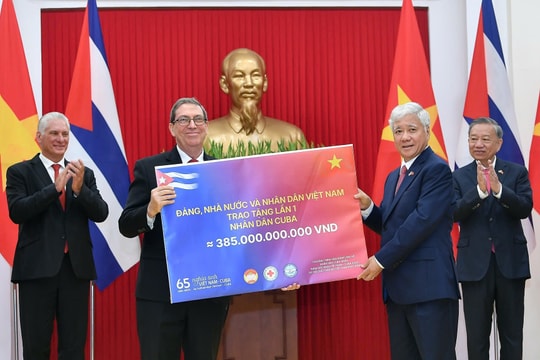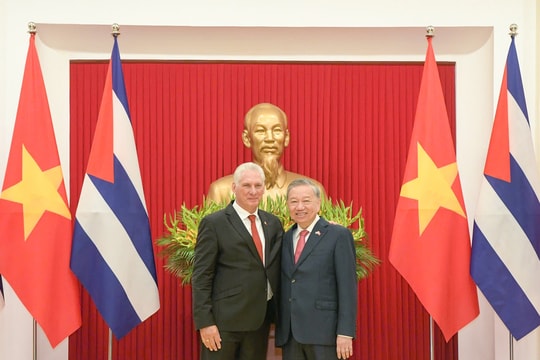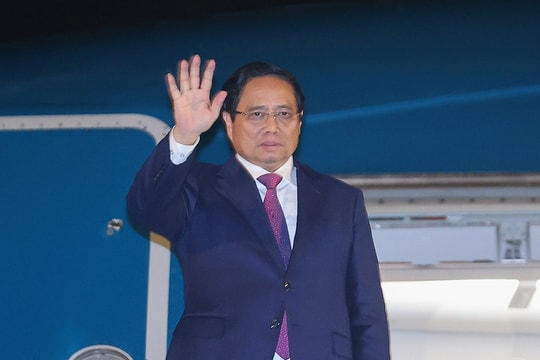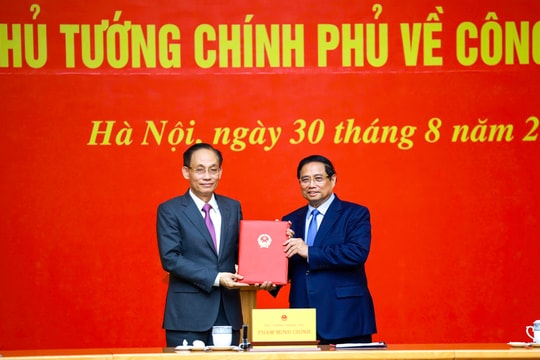25 years of Vietnam - US relations: From former enemies to partners
After 25 years of normalization of relations, Vietnam and the United States have made many positive strides.
On July 11, 1995, the leaders of Vietnam and the United States announced to the world that the two countries officially normalized relations, leaving behind the past to open a new chapter in the history of the two countries. Over the past 25 years, the cooperative relationship between Vietnam and the United States has been continuously expanded and strengthened in all fields, becoming increasingly deeper, more effective and more substantial.
The Vietnam-US relationship, from former enemies to comprehensive partners, has become a model in modern international relations. On the occasion of the 25th anniversary of the normalization of diplomatic relations between the two countries, VOV reporters interviewed Mr. Ngo Quang Xuan, former Ambassador, Head of the Vietnamese Delegation to the United Nations and international organizations in Geneva.
|
| US President Donald Trump and Prime Minister Nguyen Xuan Phuc. Photo: Nhat Bac |
PV:On the morning of July 12, 1995, in Hanoi (July 11, US time), the late Prime Minister Vo Van Kiet read the statement on the normalization of diplomatic relations between Vietnam and the United States. At that moment, what position were you holding and how did you feel at that time?
Mr. Ngo Quang Xuan:As for me personally, before and during the normalization of diplomatic relations between Vietnam and the United States, I was the Ambassador and Head of the Vietnamese delegation to the United Nations. In the story of relations between the two countries, Ambassador Madeleine Albright, who was then the US representative to the UN, often discussed with me the process of normalizing relations.
In the early days of July 1995, news came in and officially on July 11, 1995, US time, Ambassador Madeleine Albright announced that President Bill Clinton would announce the normalization of diplomatic relations with Vietnam. At that time, although I judged that the situation between the two countries was at the point where it was time to announce to the world about the normalization of relations, when I received the phone call, I was still very emotional. And I understood that this was the message from the US government to the Vietnamese government and people through diplomatic channels at the UN.
According to Vietnam time, on July 12, 1995, Prime Minister Vo Van Kiet, on behalf of the Vietnamese Government, announced that Vietnam and the United States had normalized diplomatic relations. That feeling, it can be said, is still intact for me and my colleagues at that time. Anyway, Vietnam has taken an important step in its relationship with the United States. As former Secretary of State John Kerry, a veteran of the United States in Vietnam, and Mr. John McCain, two veteran senators of the US political arena, of the Democratic Party, once said: "There is no relationship like the relationship between the two countries Vietnam and the United States that has transformed the relationship from former enemies to friendship."
PV:Dear Ambassador, what difficulties and obstacles has this normalization process gone through?
Ambassador Ngo Quang Xuan:After President Bill Clinton and Prime Minister Vo Van Kiet announced normalization, that period was still full of difficulties and obstacles. The roadmap for normalizing relations had been in place since 1991. At that time, US President Bush sent people to discuss this issue with the Vietnamese side, but it was very bumpy due to the two sides' different views on many issues. On the US side, the US Congress and government wanted to find a way to speed it up.
Because we had worked in the US for a long time, we had done in-depth research on US politics. In international relations, the US saw that it was beneficial for the US and implemented it. They saw that the relationship with Vietnam had many benefits for the US, but at that time it was not yet convincing. With that roadmap, in 1994, President B. Clinton announced the lifting of the embargo on Vietnam at the World Bank and international financial and monetary organizations.
Since then, good signals to promote multi-dimensional relations between the B.Clinton administration appeared. But the US Congress, as we know, consists of two parties, and each senator or representative has very different opinions. In the American public opinion, and in the Vietnamese community in the US, there are also different opinions. The forces opposing the normalization of relations and opposing Vietnam were still very large at that time. When President B.Clinton and Vietnam announced the normalization, both sides established embassies in each country in early August 1995.
|
| Ambassador Ngo Quang Xuan answered VOV. |
PV:To reach this 25-year milestone, the two countries have faced many difficulties and challenges with the dark legacy of war. So, according to the Ambassador, what has created the strength for the two countries to build friendship, overcome the past, and move towards the future?
Mr. Ngo Quang Xuan:The process of overcoming these difficulties and challenges is indeed very arduous, not easy. In the force supporting the normalization of relations, I often say there are two main pillars. There are very active figures such as Senator John Kerry of the Democratic Party and Senator John McCain of the Republican Party.
After the war ended, they returned to the US and realized that the US war had many problems and wanted to promote the two countries to normalization. So many sensitive issues such as the issue of Americans missing in action, they strongly promoted, regardless of the distance, difficulties, and overcame to promote the MIA file.
Before announcing the normalization of relations with Vietnam, President Clinton consulted these two senators and they assured him that Vietnam had done a very good job on this issue, very humanely. The government was highly committed and the Vietnamese people were very supportive in cooperating with the US to search for the remains of American soldiers and return them to their families. This caused great emotion in the American community.
Along with that, the relationship between mass organizations on both sides, especially American non-governmental organizations. They came to Vietnam to do many programs, even later when Mrs. Albright became the US Secretary of State under Mr. B. Clinton in 1996, she told me that: Her daughter went to Hai Phong to do humanitarian projects, when she returned she told her that "Vietnam is so lovely, I love Vietnam and you should too.”. These things have influenced the different thinking of American politicians as well as the Vietnamese community in the US. Besides, the US also sees Vietnam as a potential economic partner with whom they can have relations.
In fact, the US has become a large market for Vietnamese goods, and Vietnamese businesses are increasingly expanding their operations in the US. For example, in trade, in 1994, the two-way relationship was only about 450 million USD, and in 2019 it was about 70 billion USD. It is clear that the relationship is mutually beneficial, progressing very quickly, which is hard for a diplomat like me who has been following the relationship between the two countries for many years to imagine. Although when entering the WTO, the US initially prolonged negotiations, it was also very supportive. Before that, in 2000, Vietnam and the US signed the BTA, so when coming to the WTO, both sides made efforts to overcome barriers, such as anti-dumping trade, non-tariff...
But it is clear that both sides are trying to overcome together. Currently, the relationship between the two countries is developing in all fields. In education, the number of Vietnamese students in the US is the largest, the Vietnamese community in the US is the largest, reaching 4.5 million people. Relations in other fields such as security and defense are also beginning to develop. It is not without reason that US President D. Trump chose Hanoi to meet with North Korean President Kim Yong Un. This is an event that the world still considers to be a very strong development in the Vietnam-US relationship.
PV:Vietnam and the United States, from former enemies to trusted partners,What does this mean for international relations today, Ambassador?
Mr. Ngo Quang Xuan:I think that the relationship from former enemies to trusted partners is extremely important. Of course it is important for the relationship between the two countries, but it is also very important for ASEAN and even more important for regional peace and stability. In addition to hot spots that can explode at any time such as the Korean peninsula or the East Sea issue, there are complex issues that are simmering and can explode at any time.
So the Vietnam-US relationship plays an important role. The US also sees their direct interests that they have exploited in their relationship with Vietnam and they see the potential in their foreign affairs, not only in politics, economics, trade but also in many other fields. I believe that in the coming time, this relationship has gained momentum and will continue to develop even more strongly.
PV:Thank you, sir./.


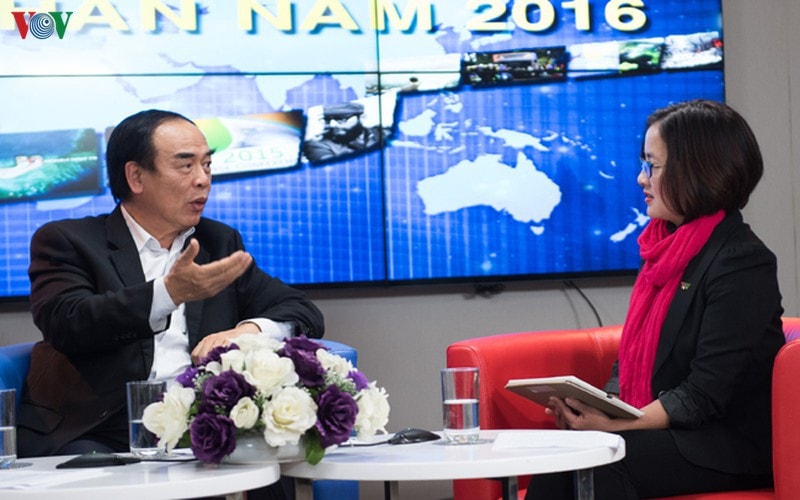
.jpg)
.jpg)
